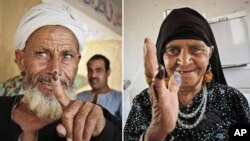CAIRO - The Muslim Brotherhood's Mohamed Morsi has claimed victory in Egypt's first post-uprising presidential race. But the rival camp of old guard candidate Ahmed Shafiq disputes the unofficial results, while the ruling military council claimed sweeping powers, throwing this major test of the nation's transition into doubt.
Morsi's claim was just one in a stunning series of events in the turmoil that has attended Egypt's historic poll.
Just after the polls closed, the ruling Supreme Council of the Armed Forces issued a constitutional declaration, granting itself legislative powers, control of the economy and the right to pick who will draft the next constitution.
With presidential powers still unclear and the Islamist-dominated lower parliament dissolved by court order Thursday, any victory Morsi might have when official results are announced later in the week would seem compromised from the start.
Meanwhile, Shafiq's campaign asserted the former Air Force commander and last prime minister under the old government had a slight lead over Morsi.
At a news conference early Monday, Morsi called for calm. He said he is seeking stability and love in a civic, national democratic and modern state.
Egypt Interim Constitution Declaration
Egypt's Interim Constitution Declaration- Published by ruling Supreme Council of the Armed Forces on June 17
- Amends the council's Constitutional Declaration of March 2011
- Requires next president to take oath of office before the Supreme Constitutional Court because parliament is dissolved
- Gives Supreme Council of the Armed Forces authority over all affairs of the military
- Makes council chairman, Field Marshal Hussein Tantawi, armed forces commander, defense minister
- Gives military leaders power to appoint panel to draft new constitution
- Postpones new parliamentary elections until new constitution is approved
- Grants military leaders powers to initiate legislation until new parliament elected
The declaration also appeared to set out a timeframe for writing the constitution and holding new elections for parliament - raising the possibility that Egypt's state of limbo, now already 16 months, could continue until nearly the end of the year.
Voter turnout in the two-day runoff election was low, an apparent sign of little enthusiasm about the two choices, neither of which many voters said represents their vision for the country's future.
For many of the people who took part in the uprising, the choice was particularly grim, prompting some to boycott the vote or go to polls and nullify their ballots.
Cairo University professor Hassan Nafaa says the problem is the ruling military has shown little acknowledgement of the events early last year.
"The thing is whether you under recognize that there has been a big revolution in this country of not and what are the needs, what are the mistakes committed by the old regime? If you draw these kinds of lessons and you try to redress the situation, maybe you will succeed. But they have a set of mind that is not capable of drawing the right lessons," said Nafaa.
The potential show-down between the two major forces of the past half-century - Egypt's military and the Muslim Brotherhood, have some concerned about a repeat of the Algerian civil war of the 1990s, after an Islamist victory at the polls was canceled.
Professor Nafaa believes the military, seen by many Egyptians as a guarantor of stability, would not engage in an armed conflict with its citizens.
"I don't think there will be a repetition of what happened in Algeria in Egypt. It is a different country and a different mentality and a different balance of forces," he said.
Nafaa does not rule out the possibility of some violence in the wake of the election, but believes the biggest fight will be the political power struggle.





